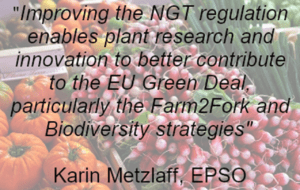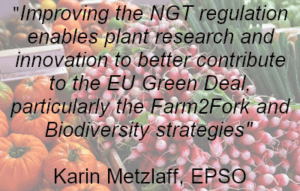NEWS
Stay updated on the latest developments in plant science policy and EPSO activities!
EPSO welcomes the European Commission consultation and provides input on the achievements and suggests where improve Horizon Europe and the next Framework Programme (FP) to have a higher impact.
The European Research and Innovation FPs are crucial to enable scientists and innovators across Europe to collaborate to generate knowledge, to apply this knowledge to address today’s and future challenges and to help build a strong, competitive and resilient, inclusive and democratic European society and improve life on earth.
Plant scientists took an active role in the EU FPs from the start and want to contribute in the future.
They are active in pillar 1, mainly in the European Research Council and the Marie Skłodowska-Curie Actions, both working very well.
They could contribute more to pillar 2, particularly in cluster 6 on Food, bioeconomy, natural resources, agriculture and environment. To this end, we suggest the following improvements:
- Further implement the following concepts:
- Address Food and Nutritional Security, environmental sustainability, biodiversity (natural and cultivated) and human health in parallel as much as possible.
- Improve / adapt crops towards ‘Diverse crops for diverse diets and human health and resilient production’.
- ‘Combine approaches on crop improvement, crop management and crop processing’.
- Policy makers should define the goals but leave the pathways to how to achieve these open to the stakeholders
- Create a new heading ‘Enabling sustainable crop improvement’ in the Work Programme and / or partnership ‘CropBooster-Quest’:
- CropBooster-Quest – Plant (systems) biology, crop improvement and plant breeding to achieve a critical mass investment enabling the community to substantially help addressing the challenges mentioned above and interacting with partnerships on biodiversity, agroecology, food systems.
- To bridge the gap until a new partnership can be active, add the heading ‘Enabling sustainable crop improvement’ in the Work Programme.
- Better link the health cluster (1) with the food, agriculture, biotechnology cluster (6) to truly enable plant biologists, breeders, processors, nutritional scientist and health experts to interdisciplinary research and innovation to improve nutritional compounds in plants for the human diet, which are then further protected during crop processing and human digestion. In addition, plant made pharmaceuticals can be co-developed for medical purposes.
All scientists would benefit from more general improvements in pillar 2 across all disciplines and sectors:
- Types of action: Add Research Actions (RAs) in pillar 2 to overcome the gap of collaborative basic research and complete the research and innovation cycle.
- Identify funding priorities: Consult European academic associations. Define the goals, but not the pathways to how to reach these to truly enable innovation.
- Implementation procedures: Increase trust in and flexibility for beneficiaries.
In the EPSO position paper we briefly explain each of these recommendations.
EPSO looks forward to further discuss and help implement these recommendations with colleagues from the European Commission and the Member State ministries and funders.
Click here to read: Full EPSO position paper on Horizon Europe and beyond
EPSO submission to the EC consultation is available here
Contacts:
Karin Metzlaff, EPSO Executive Director, BE
Odd Arne Rognli, NMBU, NO & EPSO President
In the submission to the DG SANTE public consultation on plants produced by NGTs, EPSO reiterated previous positions and pointed out that:
- In relation to NGTs, the current biosafety legislation is no longer fit for purpose and needs adaptation to scientific and technological progress.
- Since there is no difference between mutations produced using NGTs and classical mutagenesis, the same level of biosafety precautions should be applied.
- Sustainability should be managed on a system-level and not be used as a criterion solely and explicitly for NGT authorisation.
Read details in the full EPSO statement – the EPSO submission to the DG SANTE public consultation on the impact assessment of policy options regarding the legislation for plants produced by certain new genomic techniques (NGTs).
EPSO statement EC impact assessment of policy options on certain new genomic techniques, 2.12.2022
EPSO submission to the EC consultation towards impact assessment of policy options on certain NGTs, 21.7.2022 [EC LINK consultation].
EC: consultation towards the impact assessment of policy options on certain new genomic techniques (NGTs), 29.4.2022 EC LINK consultation.
Contacts:
Jens Sundström & Alan Schulman, EPSO Chairs WG Agricultural Technologies
Karin Metzlaff, EPSO Executive Director
EPSO welcomes the approach to evaluate organisms on a case-by-case basis. EPSO notes that the suggested criteria, triggered by the breeding technique, will not allow for the discrimination between plants produced by targeted mutagenesis and identical plants produced by random mutagenesis.
EFSA has developed criteria – for consideration – for the risk assessment of plants produced by targeted mutagenesis, cisgenesis and intragenesis (EFSA Journal doi: 10.2903/j.efsa.2022.7618.).
Concerning the suggested criteria, EPSO raises several points regarding definitions of the terms “exact copy”, “History of [safe] use” (HoSU) and “familiarity” – see full first reaction file.
EPSO suggest determining these definitions before a thorough evaluation of the suggested risk assessment scheme can be made and EPSO is happy to contribute to this debate on a scientific basis.
EPSO looks forward to engaging as a major stakeholder with the European Commission, Member States and the European Parliament to achieve a well-balanced policy action on plants derived from targeted mutagenesis and cisgenesis. EPSO will continue providing scientific input in the course of the consultations with the EC and other stakeholders.
Read the full EPSO first reaction to the statement from EFSA regarding “Criteria for risk assessment of plants produced by targeted mutagenesis, cisgenesis and intragenesis.”, 20.10.2022
Contacts:
Jens Sundström, EPSO Chair WG Agricultural Technologies
Alan Schulman & Karin Metzlaff (EPSO President, Executive Director)
The 16th European-wide seminar of the series by the European Plant Science Organisation (EPSO) and aimed at the Plant Science community and its stakeholders.
TTT: The seminar will be held online each third Thursday of the month at three (CET).
On 20th October 2022 at 15:00 (CET) we will present three talks exploring the “On and off-target effects during Genome Editing using different nucleases’



The seminars will be hosted on Zoom and last approximately 1.5 hours. Numbers will be limited to 300 attendees and therefore please register early if you would like to join. There will be ample opportunities to ask questions and join the debate. So please join us to support this new and exciting initiative for European Plant Science by following this link just prior to the start of the seminar.
EPSO members register in advance for this meeting:
https://us06web.zoom.us/meeting/register/tZUvc-CsrDwtGNekQfYxQm3R7Yy9nzAe-Uww
After registering, you will receive a confirmation email containing information about joining the meeting.
In the coming months we will be on the lookout for talented plant scientists among the EPSO membership to present their findings and perspectives to the EPSO seminar series. If we approach you to talk, we hope you will be happy to support the initiative. This is a fantastic opportunity for both eminent world leaders and talented up-and-coming early career researchers to present their research to an international audience and to network with potential collaborators. If you wish to suggest a theme for one of the autumn seminars and / or nominate yourself or one of your colleagues to give a seminar, we most welcome your suggestions. Please contact Tim George ([email protected]) to provide your name and potential talk title.
We look forward to seeing you all for the 16th EPSO seminar on the 20th October 2022
Tim George, Alan Schulman and Marie-Theres Hauser
EPSO Plant Science Seminar Series Organising Committee
Click here to read: Full EPSO news item
Contacts:
Tim George, Hutton / UK & EPSO Board
Alan Schulman, LUKE / FI & EPSO President
Marie-Theres Hauser BOKU / AT & EPSO Board
On 4 November 2021 EPSO member-scientists and policy makers from seventeen countries across Europe held the fifth informal meeting to assess the situation for research and development on New Plant Breeding Technologies (NPBTs) after the ruling of the ECJ in July 2018.
They exchanged views on the current situation of genome editing (GE) in Europe and possible next steps to enable Europe to better address climate change, achieve food and nutritional security, and establish a sustainable agriculture in Europe and world-wide. Such steps should bring the discussion forward on the EU legislation and facilitating potential flagships. The meeting was held under Chatham House Rules.
The next meeting will be held in May 2022.
EPSO offers to collaborate with policy makers to develop an appropriate future-ready regulation to enable the European public sector, small- and medium-sized companies and farmers to contribute more comprehensively to food and nutritional security and to use all available tools to reduce the environmental impact of agriculture. Notwithstanding the technical option retained, EPSO supports a science-based revision of the present European legislation establishing a more proportionate product-based risk assessment. EPSO is also willing to contribute to the societal debate on genome editing and to communicate in a fact-based and yet accessible manner about innovative plant science and its societal role.
Ralf Wilhelm, Jens Sundstrom, Alan Schulman and Karin Metzlaff
Contacts:
- Ralf Wilhelm & Jens Sundstrom, EPSO Chairs WG Agricultural Technologies
- Alan Schulman, EPSO President
- Karin Metzlaff, EPSO Executive Director
EPSO welcomes the initiative taken by the European Commission to adjust the regulation on NGT and promote NGT for plant breeding in the European Union (EU). Taking into account recent and ongoing research activities, EPSO would like to provide the following feedback to the Inception Impact Assessment (IIA):
- Criteria for sustainability should refer to all techniques and approaches, and not only NGTs.
- Risk assessment for NGT products should be proportionate
- Labelling and requirements for detection methods should not be barriers in the approval process.
Read details in the full EPSO statement – the EPSO submission to the DG SANTE public consultation to the Roadmap (Inception Impact Assessment, IIA) regarding the legislation for plants produced by certain new genomic techniques (NGTs).
EPSO statement EC roadmap (IIA) on new genomic techniques, 25.10.2021
EPSO Annex 1 to the NGT roadmap statement, 25.10.2021
EC: Roadmap (inception impact assessment) on new genomic techniques, 24.9.2021
Contacts:
- Jens Sundström, Ralf Wilhelm & Frank Hartung, EPSO Chairs WG Agricultural Technologies
- Alan Schulman & Karin Metzlaff (EPSO President, Executive Director)

